Where the mind is without fear and the head is held high
Where knowledge is free
Where the world has not been broken up into fragments
By narrow domestic walls
Where words come out from the depth of truth
Where tireless striving stretches its arms towards perfection
Where the clear stream of reason has not lost its way
Into the dreary desert sand of dead habit
Where the mind is led forward by thee
Into ever-widening thought and action
Into that heaven of freedom, my Father, let my country awake
Children Jumping into the Hooghly River, India
Three Questions by Leo Tolstoy
It once occurred to a certain king, that if he always knew the right
time to begin everything; if he knew who were the right people to
listen to, and whom to avoid; and, above all, if he always knew what
was the most important thing to do, he would never fail in anything
he might undertake.
And this thought having occurred to him, he had it proclaimed
throughout his kingdom that he would give a great reward to any one
who would teach him what was the right time for every action, and
who were the most necessary people, and how he might know what was
the most important thing to do.
And learned men came to the King, but they all answered his
questions differently.
In reply to the first question, some said that to know the right
time for every action, one must draw up in advance, a table of days,
months and years, and must live strictly according to it. Only
thus, said they, could everything be done at its proper time.
Others declared that it was impossible to decide beforehand the
right time for every action; but that, not letting oneself be
absorbed in idle pastimes, one should always attend to all that was
going on, and then do what was most needful. Others, again, said
that however attentive the King might be to what was going on, it
was impossible for one man to decide correctly the right time for
every action, but that he should have a Council of wise men, who
would help him to fix the proper time for everything.
But then again others said there were some things which could not
wait to be laid before a Council, but about which one had at once to
decide whether to undertake them or not. But in order to decide
that, one must know beforehand what was going to happen. It is only
magicians who know that; and, therefore, in order to know the right
time for every action, one must consult magicians.
Equally various were the answers to the second question. Some said,
the people the King most needed were his councillors; others, the
priests; others, the doctors; while some said the warriors were the
most necessary.
To the third question, as to what was the most important occupation:
some replied that the most important thing in the world was science.
Others said it was skill in warfare; and others, again, that it was
religious worship.
All the answers being different, the King agreed with none of them,
and gave the reward to none. But still wishing to find the right
answers to his questions, he decided to consult a hermit, widely
renowned for his wisdom.
The hermit lived in a wood which he never quitted, and he received
none but common folk. So the King put on simple clothes, and before
reaching the hermit's cell dismounted from his horse, and, leaving
his body-guard behind, went on alone.
When the King approached, the hermit was digging the ground in front
of his hut. Seeing the King, he greeted him and went on digging.
The hermit was frail and weak, and each time he stuck his spade into
the ground and turned a little earth, he breathed heavily.
The King went up to him and said: "I have come to you, wise hermit,
to ask you to answer three questions: How can I learn to do the
right thing at the right time? Who are the people I most need, and
to whom should I, therefore, pay more attention than to the rest?
And, what affairs are the most important, and need my first attention?"
The hermit listened to the King, but answered nothing. He just spat
on his hand and recommenced digging.
"You are tired," said the King, "let me take the spade and work
awhile for you."
"Thanks!" said the hermit, and, giving the spade to the King, he
sat down on the ground.
When he had dug two beds, the King stopped and repeated his
questions. The hermit again gave no answer, but rose, stretched out
his hand for the spade, and said:
"Now rest awhile-and let me work a bit."
But the King did not give him the spade, and continued to dig. One
hour passed, and another. The sun began to sink behind the trees,
and the King at last stuck the spade into the ground, and said:
"I came to you, wise man, for an answer to my questions. If you can
give me none, tell me so, and I will return home."
"Here comes some one running," said the hermit, "let us see who it is."
The King turned round, and saw a bearded man come running out of the
wood. The man held his hands pressed against his stomach, and blood
was flowing from under them. When he reached the King, he fell
fainting on the ground moaning feebly. The King and the hermit
unfastened the man's clothing. There was a large wound in his
stomach. The King washed it as best he could, and bandaged it with
his handkerchief and with a towel the hermit had. But the blood
would not stop flowing, and the King again and again removed the
bandage soaked with warm blood, and washed and rebandaged the wound.
When at last the blood ceased flowing, the man revived and asked for
something to drink. The King brought fresh water and gave it to
him. Meanwhile the sun had set, and it had become cool. So the
King, with the hermit's help, carried the wounded man into the hut
and laid him on the bed. Lying on the bed the man closed his eyes
and was quiet; but the King was so tired with his walk and with the
work he had done, that he crouched down on the threshold, and also
fell asleep--so soundly that he slept all through the short summer
night. When he awoke in the morning, it was long before he could
remember where he was, or who was the strange bearded man lying on
the bed and gazing intently at him with shining eyes.
"Forgive me!" said the bearded man in a weak voice, when he saw
that the King was awake and was looking at him.
"I do not know you, and have nothing to forgive you for," said the King.
"You do not know me, but I know you. I am that enemy of yours who
swore to revenge himself on you, because you executed his brother
and seized his property. I knew you had gone alone to see the
hermit, and I resolved to kill you on your way back. But the day
passed and you did not return. So I came out from my ambush to find
you, and I came upon your bodyguard, and they recognized me, and
wounded me. I escaped from them, but should have bled to death had
you not dressed my wound. I wished to kill you, and you have saved
my life. Now, if I live, and if you wish it, I will serve you as your
most faithful slave, and will bid my sons do the same. Forgive me!"
The King was very glad to have made peace with his enemy so easily,
and to have gained him for a friend, and he not only forgave him,
but said he would send his servants and his own physician to attend
him, and promised to restore his property.
Having taken leave of the wounded man, the King went out into the
porch and looked around for the hermit. Before going away he wished
once more to beg an answer to the questions he had put. The hermit
was outside, on his knees, sowing seeds in the beds that had been
dug the day before.
The King approached him, and said:
"For the last time, I pray you to answer my questions, wise man."
"You have already been answered!" said the hermit, still crouching
on his thin legs, and looking up at the King, who stood before him.
"How answered? What do you mean?" asked the King.
"Do you not see," replied the hermit. "If you had not pitied my
weakness yesterday, and had not dug those beds for me, but had gone
your way, that man would have attacked you, and you would have
repented of not having stayed with me. So the most important time
was when you were digging the beds; and I was the most important
man; and to do me good was your most important business. Afterwards
when that man ran to us, the most important time was when you were
attending to him, for if you had not bound up his wounds he would
have died without having made peace with you. So he was the most
important man, and what you did for him was your most important
business. Remember then: there is only one time that is important--
Now! It is the most important time because it is the only time when
we have any power. The most necessary man is he with whom you are,
for no man knows whether he will ever have dealings with any one
else: and the most important affair is, to do him good, because for
that purpose alone was man sent into this life!
Children Praying, Hong Kong
Wu (Fog)
In fact, I am scared.
I cannot see your face hidden in the fog.
Even in the past, for example, when I was nine,
I never thought of fog as bad weather,
even after seeing on TV
a sturdy tank driving out from a veil of fog,
I wait silently in the fog,
believing that the sun will come out,
believing that the flowers will still be there,
and you too will still be there,
after the fog has dispersed.
Children Playing with Bubbles, Singapore
Child
Your clear eye is the one absolutely beautiful thing.
I want to fill it with color and ducks,
The zoo of the new
Whose name you meditate --
April snowdrop, Indian pipe,
Little
Stalk without wrinkle,
Pool in which images
Should be grand and classical
Not this troublous
Wringing of hands, this dark
Ceiling without a star.
Sylvia Plath
Wawah & Risqi, Jakarta
It should not be assumed that Jokowi is a 'shoe in' for the Presidency.
NYT: Indonesia Candidate Tied to Human Rights Abuses Stirs Unease
"He rode into a Jakarta stadium in a jeep to greet the party faithful, mounted a horse to circle the grounds and paraded before uniformed party cadres standing at attention."
TIME: What Indonesia an Teach Thailand and Egypt About Democracy (and Vice Versa)
"Prabowo’s camp touts the ex-general as a decisive and firm leader, while Joko’s camp takes pride in his humble and down-to-earth quality. “One represents the culture of a tough military commander, and the other the culture of ordinary, rather than aristocratic, Javanese people,” wrotesenior editor Endy Bayuni in the Jakarta Post.
Although the military is out of politics, many retired officers build their second career in it. Prabowo naturally attracts quite a few former soldiers, and there are a number on Joko’s side too, including Wiranto, the Hanura Party’s founder who, in 2000, lost his post as Security Minister over alleged involvement in East Timor’s referendum violence.
But no retired officer is more polarizing than Prabowo. His critics see the 62-year-old as part of Suharto’s authoritarian regime — he was married to a daughter of Suharto, joined elite military units and took part in military operations in the separatist provinces of East Timor and Irian Jaya. His quick rise through the ranks was cut short in 1998 after he was discharged from the military because of his alleged role in the abduction of pro-democracy activists in the months before the fall of Suharto."
Woman on a Scooter, Hanoi
An excellent article in Asymptote:
A Deluge of New Vietnamese Poetry by Hai Dan-Phang
"In the audio clip of Nguyen Quoc Chanh reading his poetry you can actually hear the sounds of a city: the drone of motorbikes gliding down avenues, stray horn beeps of taxis angling through congestion, an emphatic voice from the crowd rising and breaking like a lone cloud. To my ears, it sounds just like Ho Chi Minh City. The porousness of the echo-chamber that constitutes the studio for this recording is especially audible mid-way into the third-line of the first poem in Chanh's samizdat Hey, I'm Here (2005):
Saigon punctured, a corpse not yet buried, the capital sinks a few inches each day [...] words survive thanks to crossbreeding [...] A national secret is the feasts derived from the fortunes of poppies, to be human is to be humiliated, to be Vietnamese is to be super humiliated [...] Someone advertises on the Web: I need a sexual partner who's a vanguard in thoughts and actions…"
Mother & Child, Hanoi
"Despite such obvious changes, the stories demonstrate the continued importance of the family, which on the one hand provides support for learning skills or finding a job and on the other hand needs support. This latter need is often the prime motivator to endure long separations and sometimes hard, dirty, dangerous or tedious work"
Man Beside Mercedes Benz, Bangkok
For Thai news on twitter I follow:
Jakata Selatan
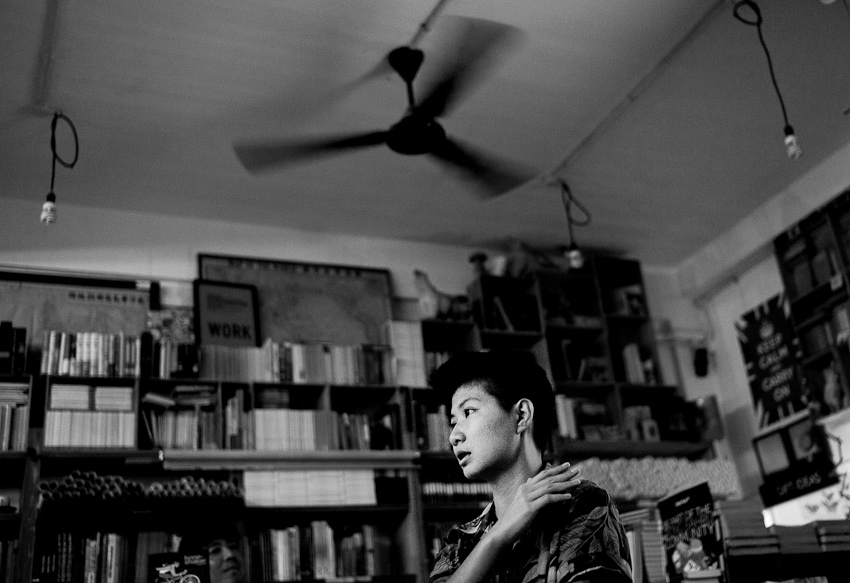
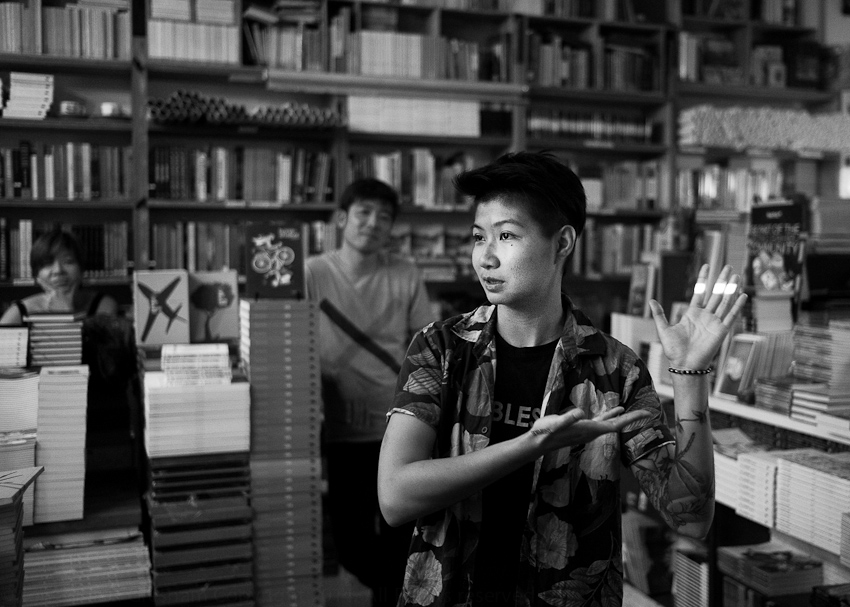
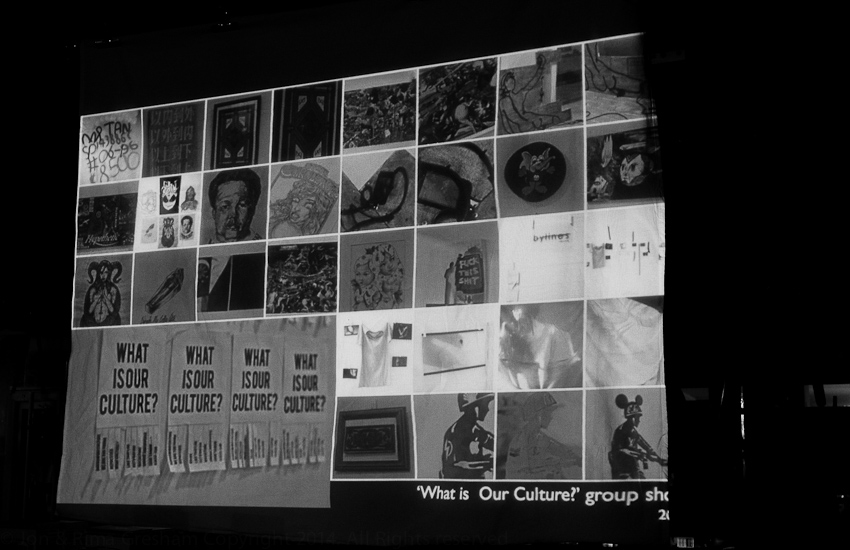
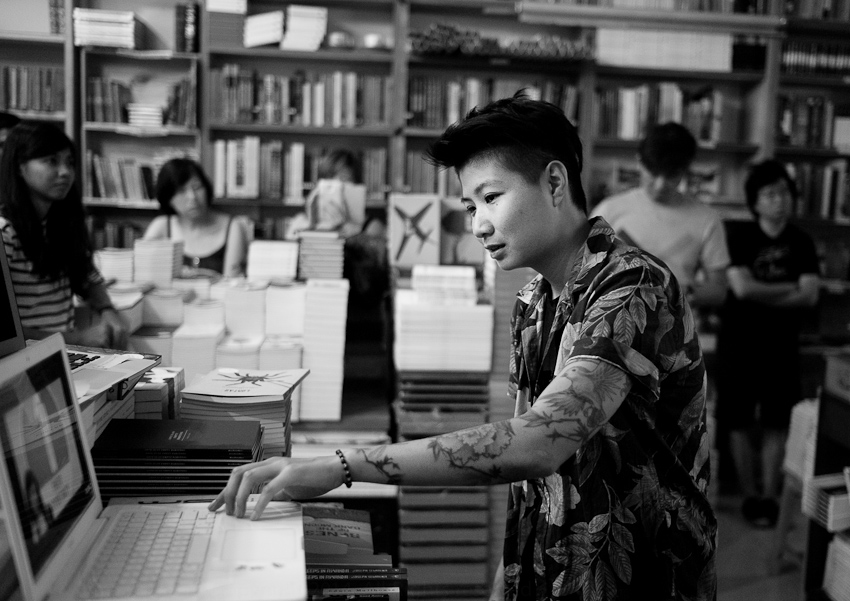
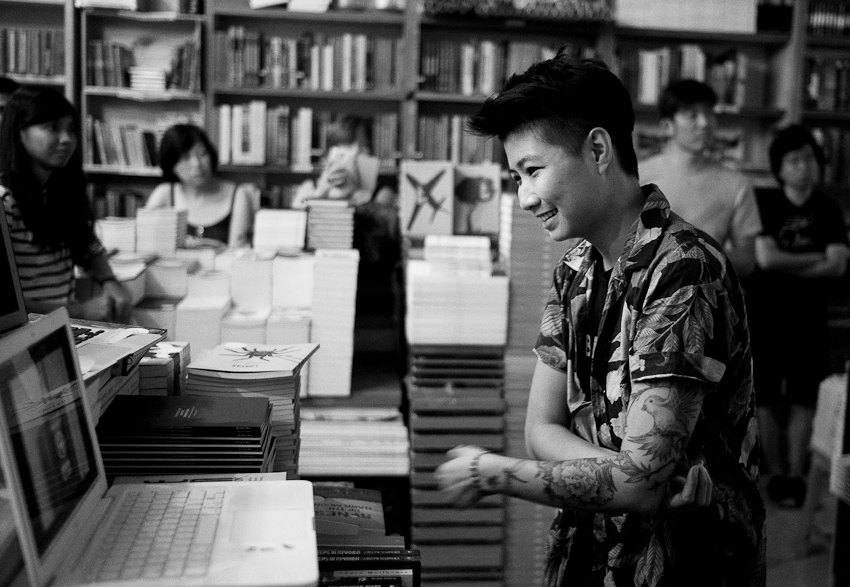
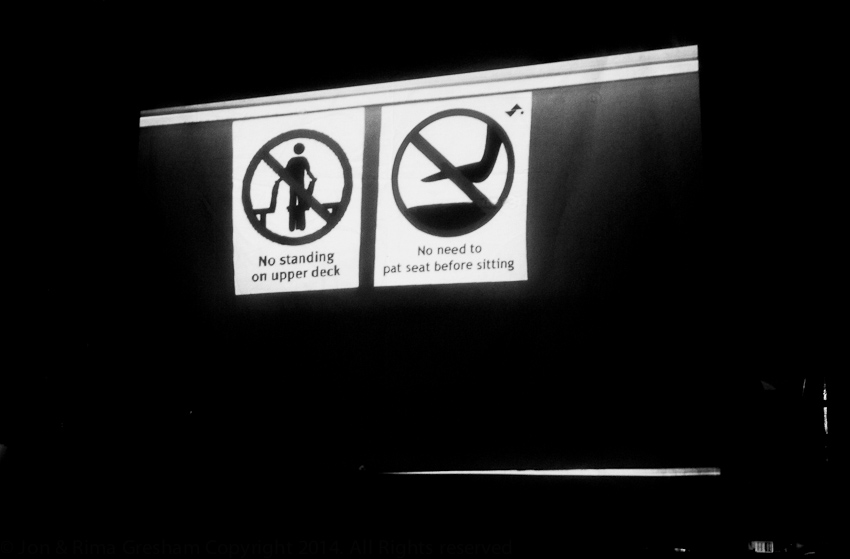
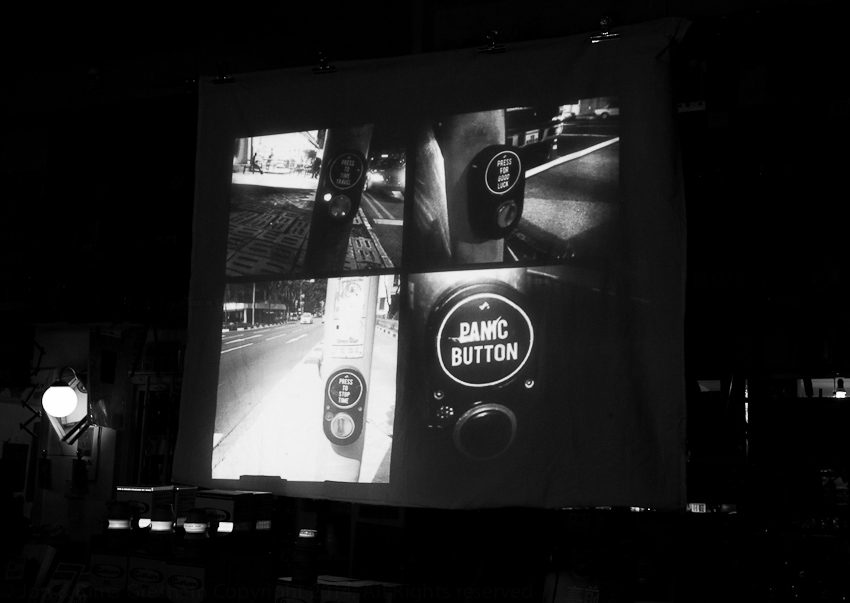
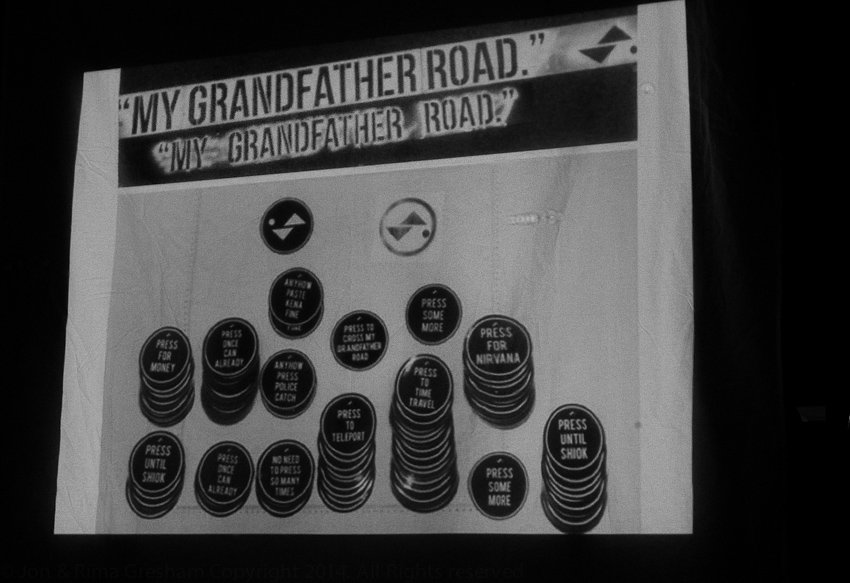
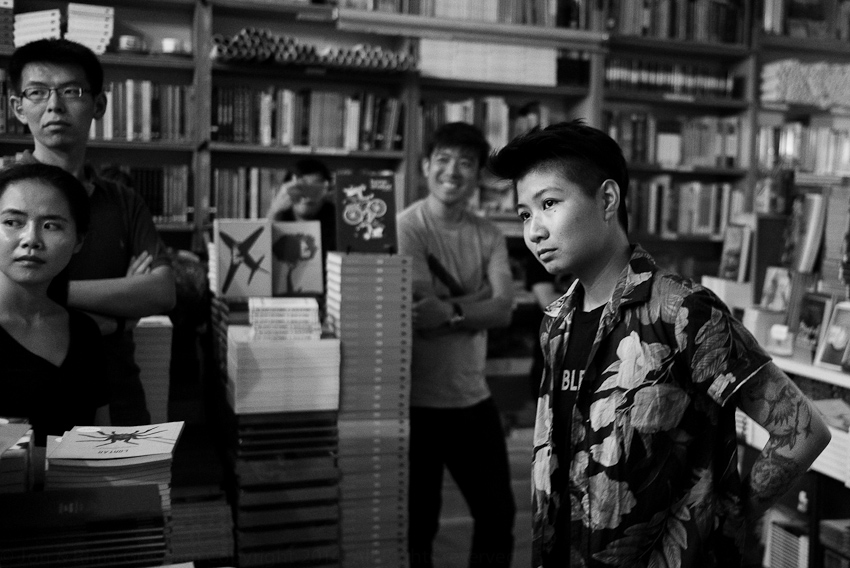
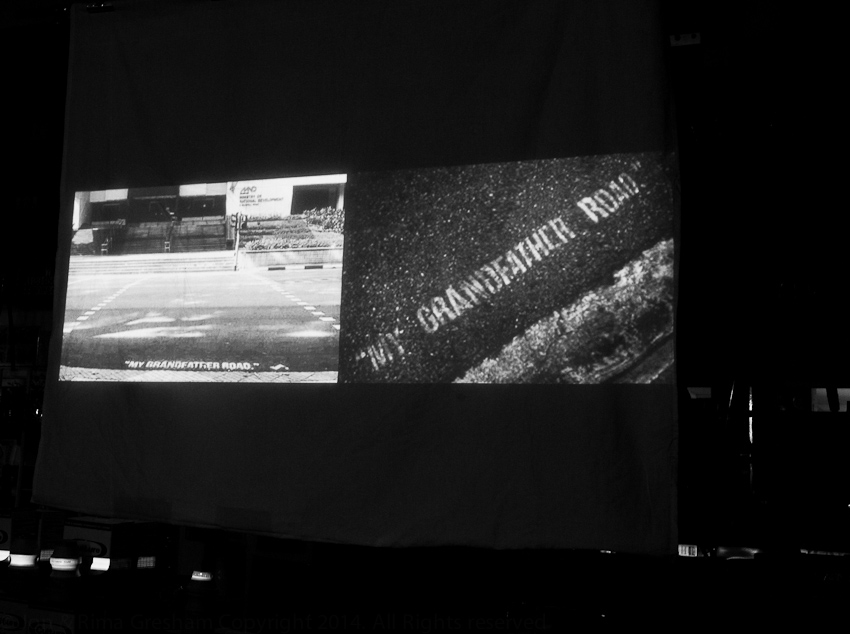
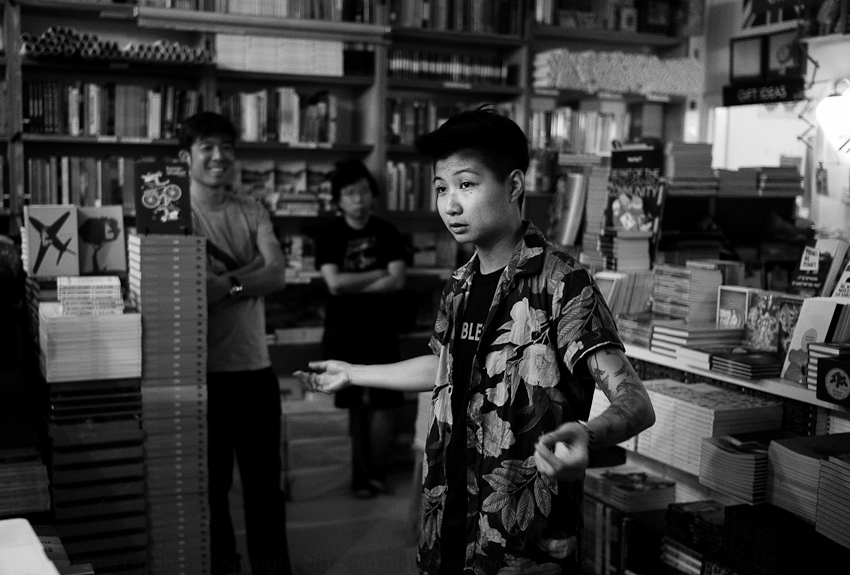
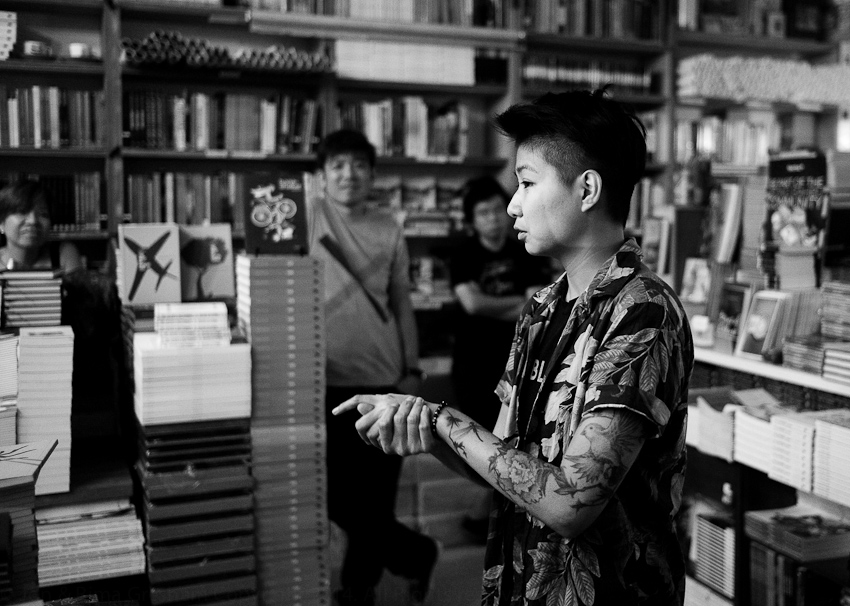
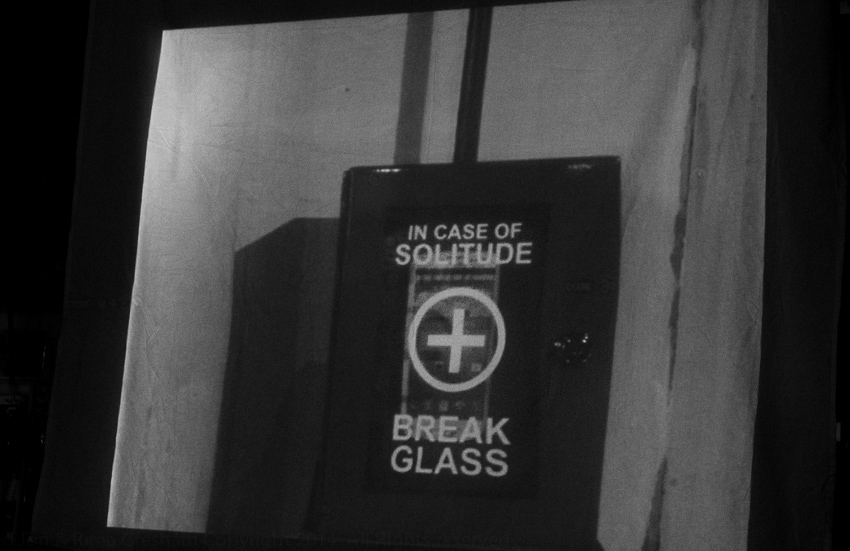
SKL0 at BooksActually
During 2012, walking along Shenton Way & Robinson Road during lunch times, I was immensely entertained by the wit appearing on pedestrian crossing buttons. Her Street Art during 2012, caught the attention of the authorities & the imagination of Singapore & the world - & raised issues of Street versus Art versus Vandalism, the relationship between the street artist, commercial & 'state graffiti' & the artist's role in society.
It was a pleasure to meet the artist responsible on 16 May 2014 at BooksActually, Sam Lo aka SKL0.
Sam shared her story, previous & current work & projects (RCGNTN, those stickers, Singapore twister & Jenga, Star Wars Sculpture, drawings & designs).
Sam was a captivating speaker & came across as a very decent, intelligent, artist who feels passionately about Singapore. You can see more of her work at SKL0 & on Instagram.
In her own words:
"It is almost impossible to talk about developing a culturally vibrant, creative or lovable city, without some tolerance for those slightly messy activities that sometimes challenge the rules. For Singapore, it would be useful to make a distinction between this kind of art and outright graffiti or vandalism that seeks to deliberately destroy public property for its own sake."
In terms of those 2012 stencils & stickers, Ng Yi Sheng, I think nails it:
"Lo’s work, on the other hand, was immediately understandable as an act of reclamation. She was a Singaporean citizen transforming sterile public spaces by making them more idiosyncratically Singaporean, via the use of Singlish. It was if the traffic lights and roads she marked were being taken back from the Singapore government and returned to the Singaporean people. They were now “our grandfather objects”, as the artist might have said – landmarks we had every right to inherit and call our own."
Long live the messiness of art & the witty, playful, challenging reclamation of public spaces by the people.
Kids Playing, Bangkok
The Second Coming
By William Butler Yeats
Turning and turning in the widening gyre
The falcon cannot hear the falconer;
Things fall apart; the centre cannot hold;
Mere anarchy is loosed upon the world,
The blood-dimmed tide is loosed, and everywhere
The ceremony of innocence is drowned;
The best lack all conviction, while the worst
Are full of passionate intensity.
Surely some revelation is at hand;
Surely the Second Coming is at hand.
The Second Coming! Hardly are those words out
When a vast image out of Spiritus Mundi
Troubles my sight: somewhere in sands of the desert
A shape with lion body and the head of a man,
A gaze blank and pitiless as the sun,
Is moving its slow thighs, while all about it
Reel shadows of the indignant desert birds.
The darkness drops again; but now I know
That twenty centuries of stony sleep
Were vexed to nightmare by a rocking cradle,
And what rough beast, its hour come round at last,
Slouches towards Bethlehem to be born?
Jakarta Selatan
"The short story believes in transformation. It believes in hidden powers. The novel prefers things in plain view. It has no patience with individual grains of sand, which glitter but are difficult to see. The novel wants to sweep everything into its mighty embrace — shores, mountains, continents. But it can never succeed, because the world is vaster than a novel, the world rushes away at every point. The novel leaps restlessly from place to place, always hungry, always dissatisfied, always fearful of coming to an end — because when it stops, exhausted but never at peace, the world will have escaped it.
The short story concentrates on its grain of sand, in the fierce belief that there — right there, in the palm of its hand — lies the universe. It seeks to know that grain of sand the way a lover seeks to know the face of the beloved. It looks for the moment when the grain of sand reveals its true nature. In that moment of mystic expansion, when the macrocosmic flower bursts from the microcosmic seed, the short story feels its power. It becomes bigger than itself. It becomes bigger than the novel. It becomes as big as the universe.
Therein lies the immodesty of the short story, its secret aggression. Its method is revelation. Its littleness is the agency of its power. The ponderous mass of the novel strikes it as the laughable image of weakness. The short story apologizes for nothing. It exults in its shortness. It wants to be shorter still. It wants to be a single word. If it could find that word, if it could utter that syllable, the entire universe would blaze up out of it with a roar. That is the outrageous ambition of the short story, that is its deepest faith, that is the greatness of its smallness."










